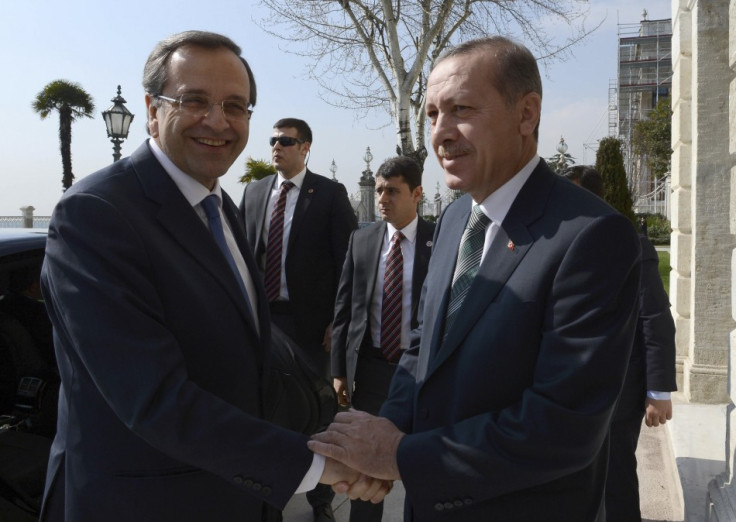A Complicated Trio: Turkey, Cyprus and the EU

German Chancellor Angela Merkel may have bolstered hopes about Turkey's accession into the European Union, but political skirmishes with Cyprus and EU ministers continue to delay its admission.
In Ankara last week, Merkel suggested Turkey be given a "privileged partnership" rather than granted full EU membership status, adding that the bloc should move talks on.
"In recent times, negotiations stalled somewhat and I am in favour of opening a new chapter in order to move forward," said Merkel.
But this note of cautiousness and scepticism is a wise move on Merkel's part.
Germany houses almost 3m Turks and Turkey is Germany's largest trade partner outside of the EU, with exported goods from Turkey to Germany amounting to $13.9bn [£9.2bn; €10.6bn] in 2011.
According to the latest data from the Turkish Statistics Board, Turkey's exports to EU increased by 7.2 percent in January, with Germany at the top of the list for export destinations followed by Russia.
Nonetheless, Merkel and the Christian Democratic Party have been aware of the larger implications of accepting Turkey into the EU, as this would challenge European demographics through the addition of such a large Muslim population to the predominantly Christian Europe.
Turkey, however, seems to be tiring the continual limbo it has endured since first commencing talks on joining the EU in 2005.
Over the years, Turkey's leaders have been increasingly vocal about their dissatisfaction with its exclusion from full EU membership status.
In October last year, Turkey's economy minister lashed out at the EU, calling it "the most hypocritical organisation in the world," just after the bloc of nations won the Nobel Peace Prize.
Zafer Çağlayan said that "the EU is the most two-faced union of all time. It is the most hypocritical organisation in the world. This EU has kept Turkey waiting at its door for 50 years."
Fast-forward to this year and anger is still brewing from Turkey's officials.
"Membership is like pregnancy: you either are or you aren't. There is no halfway position," said Turkey's Europe minister Egemen Bagis at a conference last month.
Although Turkey had applied for an associate membership in the European Economic Commission (EEC) back in 1959, it has been hoping to gain full EU membership since the talks opened eight years ago.
Economically, Turkey has a lot to offer and was the fastest growing economy in Europe in 2011, posting an 8.5 percent growth rate. But last year, like many countries, it experienced a slump in growth as the global slowdown stymied its exports and capital inflows.
But this is not the sticking point; there are thornier issues that undermine Turkey's bid to join the EU as a fully-fledged member.
"We want to bury the Cyprus problem," said Erdogan during the signing of the bilateral pact with Greek Prime Minister Antonis Samaras on Monday.
However, it is very easy for Erdogan to declare that the problem of Cyprus should be relegated to the past, rather than actually acknowledge that on 20 July 1974 Turkey occupied Northern Cyprus and since then has been the only country to recognise the Turkish Republic its troops created there.
It is precisely this occupation of another EU country, and the non-recognition of the Republic of Cyprus as an occupied territory, that casts a shadow over Turkey's wish to join the EU.
Turkey has continuously refused to open its ports up to Cyprus, and has laid grand claims over complicated maritime borders and hydrocarbon research blocks around the Mediterranean island.
This has only served to inflame tension in the Aegean over the oil and gas reserves found on the outskirts of Cyprus Not only has this challenged Cyprus's EEZ agreements, it has challenged the country's sovereign right to explore natural resources on its own territory.
Ultimately, Erdogan is oversimplifying the problem of Cyprus by wanting to 'bury' it, when in fact the Cyprus dispute is very much alive and kicking.
Turkey has to make concessions and solve the Cyprus dispute, as well as confronting its domestic minority rights issues, the limitation of free speech as depicted by Turkey's infamous Article 301 and the jailing of journalists. If it can't do this, it is exceedingly difficult to foresee Turkey joining the EU anytime soon.
Nadin Rayya is a journalist at IBTimes UK and holds a degree in politics and international studies and a masters in media communications.
© Copyright IBTimes 2025. All rights reserved.



















